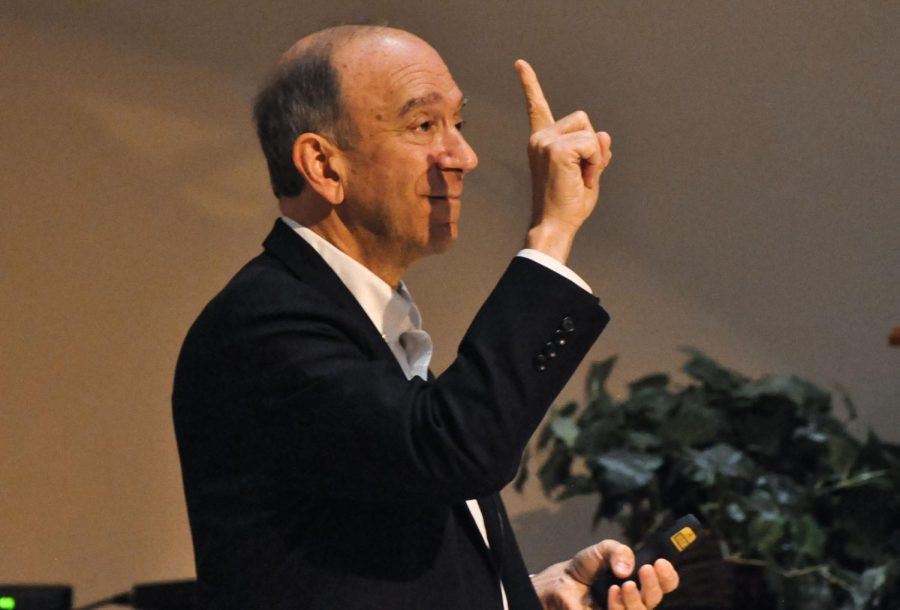Harvard professor visits University, raises environmental awareness
Ahead of Earth Day, Richard Lazarus brought his fight for environmental change to campus
Richard Lazarus, Harvard professor and environmental lawyer, speaks at the Spurlock Museum about his book, “The Rule of Five: Making Climate History at the Supreme Court.” on Wednesday.
Apr 22, 2022
When environmental lawyer Richard Lazarus attended the University as an undergraduate, the environmental studies program didn’t exist. Instead, he studied chemistry and economics — his own formula of “pre-environmental law.”
After his time at the University, Lazarus earned his J.D. from Harvard Law School and dedicated his legal career to advocating for the environment. Lazarus has since been teaching at Harvard Law and an environmental champion, arguing cases about the environment in front of the Supreme Court.
Lazarus credited the start of his illustrious career as an environmental lawyer to the University. He reminisced about his excitement of taking an environmental economics course and studying a whole chapter related to sustainability in his chemistry class. He said that class fueled his interest and passion for the environment.
“I tried to figure out what I was passionate about and what I was good at,” Lazarus said. “The two aren’t necessarily the same thing, but I didn’t want to be mediocre at what I was doing, and I didn’t want to spend my time doing something I didn’t care about. That’s how I picked environmental law.”
Becoming a professor was always been part of Lazarus’ plan. Lazarus said he was inspired by his late father who was a professor in the University’s Physics Department. In addition to being a lawyer and professor, Lazarus was also an author.
Get The Daily Illini in your inbox!
“Back then, I worked my days at the Illini Union Bookstore, which is why I’m glad the bookstore is still here selling books,” Lazarus said.
In honor of Earth Week, the University’s Institute of Sustainability, Energy and Environment invited Lazarus to discuss issues pertaining to environmental law.
Lazarus appeared Wednesday at the Spurlock Museum for a discussion based on his most recent book, “The Rule of Five: Making Climate History at the Supreme Court.” The title refers to how the fate of the first major environmental case in American history was decided upon 5 votes. He talked about how it all just started with one person deciding to take action.
Eric Freyfogle, professor in Law and longtime friend of Lazarus, said he admired Lazarus’ ability to connect environmental issues to personal, individual concerns.
“He turned what for most people would be a legal controversy into a real-life story about real people,” Freyfogle said. “It ends with I think the particularly heartwarming conclusion that the work of one person really made a difference.”
Lazarus also discussed the issues preventing progress with environmental issues in the U.S. today. Lazarus said despite the proof science has provided, the reality is there is less actually being done about climate change today.
“One thing that’s changed a lot since I was a student here in the ’70s is the complete political consensus,” Lazarus said. “Here, the laws that passed through had overwhelming bipartisan support.”
Lazarus said since environmental concerns became a political agenda, the focus shifted to a “left versus right” argument. But despite that, he emphasized the power individuals have when voting for related issues and for elected officials.
Despite discouraging changes, Lazarus also brought up positive changes such as the growing interest in sustainability in corporations. Environmental issues are more pressing on companies since the effects of climate change became financially harsh.
Lazarus said another positive change in higher education and is has been happening at the University.
“My area of environmental interest didn’t really exist when I was a student here,” Lazarus said. “Now, you have things like the Institute of Sustainability, you have environmental law programs and you have the environmental science and engineering program. It’s sort of everywhere in the University. That’s a huge change.”
Lazarus also said hard-working staff members and scientists who are part of government institutions such as the EPA have been extremely important. He said political agendas caused the lack of interaction with EPA. However, Lazarus encouraged students to apply for and support environmental jobs regardless of the political climate.
Dan Garza, graduate student studying Law, said he wished the University would bring more environmental speakers to campus.
“I’m sure it’d be great if they get some more speakers,” Garza said. “I mean, this was extremely interesting. More events and more publicity would be great.”






